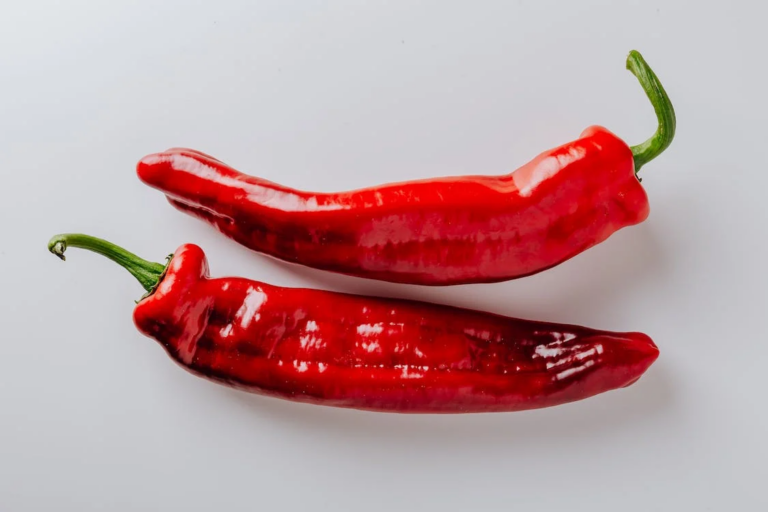Is Spicy Food Good For You?
Do you like spicy food? Do you enjoy adding spice to your food? You might be shocked to learn that eating spicy food can be healthy, though. Consuming spicy food is actually associated with a number of health benefits. Spicy food has been connected to a variety of beneficial health outcomes, from increasing metabolism to lowering inflammation. We’ll look at the top 8 unexpected health benefits of spicy food in this article. So if you’re interested in learning more about the potential health benefits of spices or just love spices in general, keep reading.
What Makes Food Spicy?
Let’s first examine what makes food spicy before moving on to the health advantages of spicy food. A substance called capsaicin, which is present in chili peppers, is what gives food its spiciness. Capsaicin, an ingredient in hot foods, binds to pain receptors in your mouth and throat, alerting your brain that your mouth is on fire. Endorphins, which are natural painkillers that make you feel good and euphoric, are released as a result of this. A food will be spicier the more capsaicin it contains.
However, other ingredients can also make food spicy. Compounds found in mustard, black pepper, ginger, and other spices can also produce a similar heat sensation. These spices lack capsaicin and are not nearly as potent as chili peppers.
Why Do We Like Spicy Foods?
Let’s investigate why some people enjoy spicy food while others can’t stand it now that we understand what makes it spicy. Some people love spicy food just because it tastes good. They like the variety of flavors that spicy foods offer and how it can make other ingredients in a dish taste better.
Others, however, love spicy food for reasons other than flavor. According to studies, people who regularly consume spicy food are more tolerant of pain than those who are not. This is due to the fact that over time, capsaicin can desensitize pain receptors, reducing their sensitivity to discomfort. Additionally, eating spicy food can release endorphins, which can produce a pleasurable sensation that keeps people coming back for more (1).
8 Health Benefits of Spicy Food According to Science
Let’s explore the unexpected health advantages of spicy food now that we know the science behind it and why people like it. The following 8 advantages are supported by scientific research:
1. Boosts metabolism
Spicy food may be your secret weapon if you’re trying to lose weight or keep it off while maintaining a healthy weight. Capsaicin, the ingredient that gives spicy food its heat, has been shown in studies to speed up metabolism and aid in fat burning (2). Red pepper consumption has been shown to boost metabolism by up to 20% for up to 30 minutes after eating, according to one study (3). This means that eating spicy food may increase calorie burning and help you lose weight.
That’s not all, though. Capsaicin has also been demonstrated to lessen appetite and heighten feelings of satiety, which may aid in reducing overeating and between-meal snacking. So, if you find yourself getting hungry again, try adding some spice to your food and see if that helps.
2. Reduces inflammation
Although chronic inflammation can contribute to a number of health issues, such as arthritis, diabetes, and heart disease, it is a normal reaction to injury or infection. Fortunately, some evidence points to capsaicin as a potential anti-inflammatory in the body (4).
One study discovered that capsaicin can prevent the body from producing specific inflammatory markers, and another discovered that capsaicin can lessen inflammation in the gut (5). These results suggest that eating spicy food may reduce inflammation in the body, though more research is necessary to fully understand the anti-inflammatory properties of capsaicin.
3. Lowers blood pressure
Hypertension, or high blood pressure, is a significant risk factor for heart disease and stroke. Nevertheless, some research indicates that eating spicy food may lower blood pressure (6).
Consuming capsaicin may aid in blood vessel dilation, which can enhance blood flow and lower blood pressure, according to one study (7). Consuming spicy food can enhance blood vessel function in people with hypertension, according to another study (8). These results are encouraging, even though more investigation is required to fully comprehend the connection between spicy food and blood pressure.
4. Improves digestion
There is a good reason why spicy food has long been used to aid digestion. It has been demonstrated that capsaicin increases the production of digestive enzymes, which can aid in food breakdown and enhance digestion (9). Additionally, eating spicy food can encourage the release of gastric juices, which can help with digestion and ward off problems like bloating and constipation.
However, it’s important to keep in mind that some people, especially those who suffer from conditions like irritable bowel syndrome (IBS) or acid reflux, can experience digestive tract irritation from spicy food (10). It’s best to consume spicy food in moderation and pay attention to how your body reacts if you have a sensitive stomach.
5. Relieves pain
Contrary to popular belief, eating spicy food may actually reduce pain. According to research, capsaicin has analgesic qualities and can help lessen pain and discomfort (11).
According to one investigation, people with ailments like neuropathy and rheumatoid arthritis can experience pain relief by applying capsaicin cream to their skin (12). Consuming capsaicin can lessen headache pain, according to another study (13). These results imply that eating spicy food may have some potential as a natural pain reliever, though more research is required to fully understand the pain-relieving effects of capsaicin.
6. Boosts immunity
Additionally beneficial to the immune system, spicy food. According to research, capsaicin has antimicrobial properties and can help fight off viruses and bacteria (14).
In one study, capsaicin was found to be able to stop the growth of specific bacteria (15), and in another, it was discovered that mice’s immune systems could be strengthened by capsaicin (16). These results are encouraging, but more study is required to fully understand how capsaicin strengthens the immune system.
7. Protects against cancer
While more research is required, some studies indicate that eating spicy food may protect against some cancer types. According to a study (17), capsaicin has been shown to have anti-cancer properties, which means it can aid in preventing the growth and spread of cancer cells.
While another study discovered that capsaicin can help induce cell death in lung cancer cells (18), the same study discovered that capsaicin can help stop the growth of prostate cancer cells. These results are encouraging, even though more research is necessary to fully understand the anti-cancer properties of capsaicin.
8. Improves mood
And finally, eating spicy food may improve your mood. Endorphins, which the body naturally produces and which have been shown to help with mood improvement and stress reduction, are stimulated by capsaicin, according to research (19).
One investigation discovered that eating spicy food can elevate mood and heighten pleasure levels (20). Additionally, capsaicin has been demonstrated to have anti-anxiety properties, which means it can aid in lowering anxiety and stress levels (21). These results are encouraging, but more study is required to fully understand how capsaicin improves mood.
Can Spicy Foods Be Dangerous?
Although eating spicy food has many health advantages, it’s important to remember that some people may find it dangerous. Consuming hot food can aggravate digestive problems and make ulcers and acid reflux worse. In addition, some people might be allergic to particular spices, which could result in allergic reactions like hives, swelling, and breathing difficulties. It’s important to consult your doctor before eating spicy food if you have any underlying medical conditions or allergies.
How to Get Better at Eating Spicy Foods
If you’re not used to eating spicy food, you might initially find it challenging to handle. However, there are some methods you can employ to improve your ability to eat spicy food:
- Start small – Add a little spice to your meals at first, and then gradually increase it as you go along.
- Build tolerance – Consume spicy food frequently to increase sensitivity.
- Drink milk – If you’re having trouble with the heat, you can help your mouth cool down by drinking milk or eating something dairy-based.
- Avoid water – It is best to stay away from water when eating spicy food as it can actually increase the heat.
- Take it slow – Don’t rush through your spicy meal. Take your time and savor the flavors.
Does Your Stomach Get Used to Spicy Food?
You might be wondering if your stomach adjusts to spicy food over time if you enjoy it. Yes, is the response. Over time, your body may develop a tolerance for the heat of spicy food. In order to get the same level of heat, you might need to eat spicier food. This does not imply, however, that your body is not benefiting from spicy food’s health advantages. As we previously discussed, capsaicin has a number of health advantages whether or not you feel the heat.
The Healthiest Hot Peppers
Hot peppers come in different varieties. There are healthier peppers than others. The following hot peppers are among the healthiest:
1. Cayenne Pepper
Cayenne pepper is high in capsaicin and has been found to have a number of health advantages, including the ability to help with weight loss, lower inflammation, and enhance digestion.
2. Jalapeno Pepper
Jalapeno peppers are an excellent source of vitamin C and have been shown to have antibacterial properties. Jalapeno pepper has also been shown to help with inflammation control and weight loss.
3. Habanero Pepper
The habanero pepper ranks among the spiciest and contains a lot of capsaicin. Numerous health advantages of habanero pepper have been discovered, including support for weight loss, the reduction of inflammation, and immune system stimulation.
FAQs
1. Why does capsaicin clear sinuses?
You’re not alone if you’ve ever eaten something spicy and noticed that your sinuses felt better afterwards. By promoting mucus production and assisting in the opening of nasal passages, capsaicin can facilitate better breathing and relieve sinus congestion.
2. What helps relieve spicy food?
There are a few things you can do to help relieve the pain if you’ve eaten something that was too spicy for you to enjoy. Milk and other dairy products, as well as starchy foods like bread and rice, can help to reduce heat. Further gastrointestinal irritation can be avoided by staying away from caffeine and alcohol.
3. Does spicy food boost testosterone?
Although some research has suggested a connection between spicy food and higher testosterone levels, the evidence is conflicting. To fully comprehend how spicy food and testosterone interact, more study is required.
4. Does hot sauce cause ulcers?
Consuming spicy food does not lead to ulcers, despite what many people think. Capsaicin may actually help prevent the onset of ulcers by reducing gut inflammation, according to some research.
5. Is spicy food good for congestion?
Yes, spicy foods can help clear up congestion by widening nasal passages and encouraging mucus production.
6. Can spicy food increase heart rate?
A temporary increase in heart rate can be brought on by spicy food by the release of adrenaline, but this effect is usually mild and transient.
7. Can cancer patients eat spicy food?
There needs to be more research, but some studies indicate that eating spicy food may help prevent some cancers. However, it’s best to consult your doctor if you’re receiving cancer treatment to make sure that eating spicy food won’t affect your treatment.
8. Is it good to sweat when eating spicy food?
Yes, it is typical to sweat after eating spicy food. The body cools down and regulates body temperature by sweating. Sweating can also aid in the removal of harmful toxins from the body.
9. Why does milk help with spicy food?
A protein found in milk by the name of casein can aid in balancing the components that give spicy food its heat. Milk also has fat, which can help the body absorb capsaicin and lessen the heat’s sensation.
10. What does hot pepper do to your body?
A chemical called capsaicin is found in hot peppers, and research has shown that it has a number of health advantages, including lowering inflammation, enhancing metabolism, and preventing cancer. Capsaicin has also been discovered to have analgesic properties, which can aid in pain relief.
11. Is spicy food good for weight loss?
Yes, eating spicy food can aid in weight loss. Spicy foods have been shown to speed up the metabolism, which can aid in weight loss. Additionally, eating spicy food can help suppress appetite and heighten feelings of fullness, both of which can aid in weight loss.
12. Does spicy food boost your metabolism?
Absolutely, spicy food can increase your metabolism. The compound in chili peppers known as capsaicin has been demonstrated to increase the body’s thermogenesis, or heat production, which may result in an increase in metabolic rate.
Conclusion
In conclusion, there are a number of ways that eating spicy food is good for your health. The health advantages of spicy food are numerous and tantalizing, from increasing metabolism to lowering inflammation. However, it’s crucial to keep in mind that spicy food can also be harmful for some individuals, so it’s crucial to speak with your doctor if you have any concerns. If you’re not used to eating spicy food, start out mild and gradually increase your tolerance. With these pointers in mind, you can take advantage of the many health advantages of spicy food while also appreciating the mouthwatering flavors.



